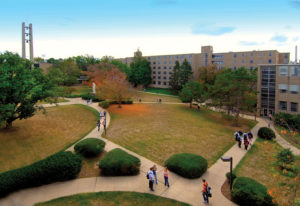February 2013
By Amy Murdoch, Ph.D., Assistant Professor
 Q: Why did you participate in the IDA review process?
Q: Why did you participate in the IDA review process?
A: For us, the decision was an easy one. We highly value the work of the IDA Knowledge and Practice Standards Committee and wanted to be part of this important movement in education. We are exceedingly proud to be a graduate program where all of our courses teach the Science of Reading, and as a new program, we embraced the chance to be given feedback about our curriculum
by an organization with expertise in reading research.
Q: How was the experience of preparing for and participating in the review?
A: The IDA review is a very thorough review, and although a thorough review of one’s program is never an easy undertaking, the self-study and the interactions with the reviewers were extremely helpful in further strengthening our program. As a result of the review process, we clearly saw our strengths but also identified areas we wanted to adjust. The process led us to additional resources that were added to our courses, adjustments to some courses, and adding a Dyslexia Certificate program.
Q: What does IDA Recognition mean to your university?
A: It is an important stamp of quality. The IDA Recognition signifies that our curriculum provides teachers the knowledge and skills needed to implement research based reading instruction to all children. We are a small college, and we pride ourselves in providing unique and quality instructional experiences to our students. The IDA Recognition gave us a national platform to highlight our unique program. Being one of the first to engage in this process is an honor.
Q: How has your program leveraged outside partnerships to increase students’ learning experience?
A: Our program is done in partnership with the Mayerson Academy professional development center. This important partnership allowed our small college (2 graduate reading faculty members) to partner with another organization dedicated to training teachers in the Science of Reading. Through this partnership both organizations are strengthened and are able to expand the coursework opportunities for teachers. Mayerson Academy is a Language Essentials for Teacher of Reading and Spelling (LETRS) affiliated training site and offers Orton-Gillingham training that is certified by the International Multisensory Language Education Council (IMSLEC). Both LETRS and Orton-Gillingham coursework are embedded within our program. Additionally, through this partnership we are planning an innovative online format of our program starting in 2014.
Q: Describe some of the innovative ideas you have implemented to give students a richer practicum experience.
A: Our program currently offers three practicum experiences. It is important to note that all of our graduate students are full-time teachers. The first practicum is our summer Orton-Gillingham basic course. This course is taken after our 4 foundational courses in Reading Science. In this practicum course our graduate students learn Orton-Gillingham and tutor children using this technique one-on-one under the close supervision of a Master Orton-Gillingham Teacher. Students then take our Advanced Orton-Gillingham course the following fall and at the same time take our Advanced Reading Practicum where they are supported by a Master Orton-Gillingham teacher in the implementation of Orton-Gillingham in their classroom setting (whole group, small-group and/or individual instruction). The goal here is to help them generalize the skills learned in the courses into their classroom settings. The final practicum focuses on vocabulary and comprehension instruction. This practicum involves weekly class meetings with a Reading Science faculty member and the implementation of research-based instruction in their school setting. As part of the course, graduate students discuss and research instructional techniques and then try them out in their classrooms, and results are shared in the weekly meetings. The faculty member provides course content in the weekly meetings and also visits classrooms for supervision and feedback on implementation.
For more information on College of Mount St. Joseph’s Master of Arts: Teacher Enhancement Programs, Read More.
Copyright © 2013 International Dyslexia Association (IDA). We encourage sharing of Examiner articles. If portions are cited, please make appropriate reference. Articles may not be reprinted for the purpose of resale. Permission to republish this article is available from info@interdys.org.

